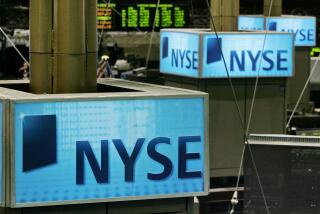Corporate scapegoat watch: If earnings are soft, blame Obamacare!
Corporate executives love nothing more than a scapegoat to saddle with blame for their own mediocre performances. As we reported late last year and USA Today confirms again, they’re finding the Affordable Care Act to be a gold-plated gift. It’s almost as useful as the lousy winter weather, which is saying something.
USA Today reports that of 446 companies in the S&P 500 that have reported first-quarter results so far, 30 have mentioned the Affordable Care Act, most of them negatively.
But for companies with 100 employees or more, the Affordable Care Act’s employer mandate doesn’t kick in until 2015. The mandate has been further softened: In 2015, big employers will have to offer coverage to just 70% of their full-time workers to escape a penalty, rising to 95% of full-timers in 2016.
There’s also a tax to be assessed on high-value “Cadillac” plans, which may cover many plans offered even to rank-and-file workers by major corporations. But that tax doesn’t kick in until 2018, and the smart money in Washington is betting that it will be dropped or modified before then.
So claims by public companies that their results are being impacted by the law need to be taken with a mound of industrial-strength salt.
Indeed, USA Today’s examples of companies that have blamed poor results on the Affordable Care Act show how weak the maneuver is.
Take UPS, which has been a trend-setter in blaming Obamacare for its own cost-cutting decisions. (The company kicked 15,000 spouses who had access to their own employer coverage off the UPS health plan last year because, you know, Obamacare.) In the company’s first-quarter earnings conference call on April 24, UPS Chief Financial Officer Kurt Kuehn lamented that “sponsorship of healthcare plans has become expensive, largely due to high healthcare inflation trends and legislation like the Affordable Care Act.”
Accordingly, he said, “After much evaluation, we determined that the best path for UPS was to move our union employees to multi-employer healthcare plans. In simple terms, UPS is moving from a defined healthcare benefit plan to a defined contribution environment with the contribution set for the duration of the contract.”
In other words, UPS is moving its unionized employees and retirees to union-run health plans, but will provide a set sum per employee to the unions. The company expects to save money over time, but it will have to pony up a huge sum at first to cover the obligation. Kuehn didn’t say what that sum would be, but essentially he was softening up investors for what could be a very sizable charge against earnings in an upcoming quarter. Clever.
Then there’s the low-price retailer Dollar General. On March 13 its CFO, David Tehle, cannily lumped in the Affordable Care Act with upcoming incentive payments for executives as “significant headwinds” facing company earnings this year. Sounds scary. But it turns out that the executive pay headwind will come to $35 million, or seven cents per share. The ACA? As little as $10 million, or two cents per share.
Significantly, and typically, Tehle didn’t explain what it was about the ACA that causes any headwind at all. Significantly, and typically, the investment analysts listening in on the earnings conference call didn’t ask.
USA Today cites Cognizant Technology Solutions, which provides billing services to the healthcare industry, as a third company taking the ACA’s name in vain. But here it looks like the newspaper got it wrong.
Yes, Cognizant President Gordon Coburn observed that the ACA “contributed to a slow start in spending for the sector as they adjusted to... the evolving healthcare reimbursement structure.” But Chief Executive Officer Francisco D’Souza made clear the slowdown is temporary, and the future is quite promising. “It will take some time for us to reach somewhat of a new normal in healthcare,” he said, “and through that, there will be opportunities for us at Cognizant to capitalize on opportunities.”
It sounds like he sees Obamacare as a long-term plus for his company, but it’s positioned itself to have it both ways: If earnings are bad, Cognizant can keep blaming the ACA; if they’re good, its executives can pat themselves on the back for seeking opportunities and making the best of them.
The most persistent trend in corporate healthcare is the narrowing of employee benefits, accompanied by fingerpointing at Obamacare. Employees need to see through this. The truth is that employer plans have experienced some of their smallest annual increases since the ACA’s enactment in 2010. Last year premiums rose by an average 3.85%, half the average increase since 1999. (The figures come from the Kaiser Family Foundation’s annual survey of employer health benefits, 2013 edition.)
But deductibles, co-pays and employee premium share have been rising for nearly a decade. This trend has nothing to do with the ACA, and everything to do with the squeeze on the rank and file by corporate managements that keep more for themselves. Workers who accept the argument that Obamacare is forcing the squeeze on healthcare benefits are letting their own bosses off the hook.







